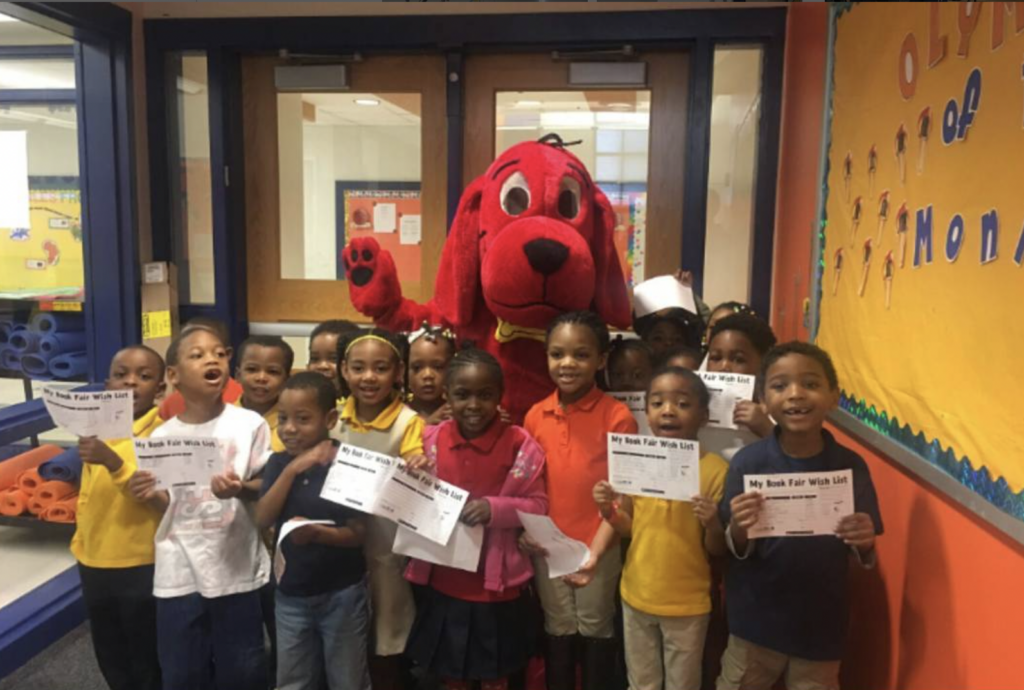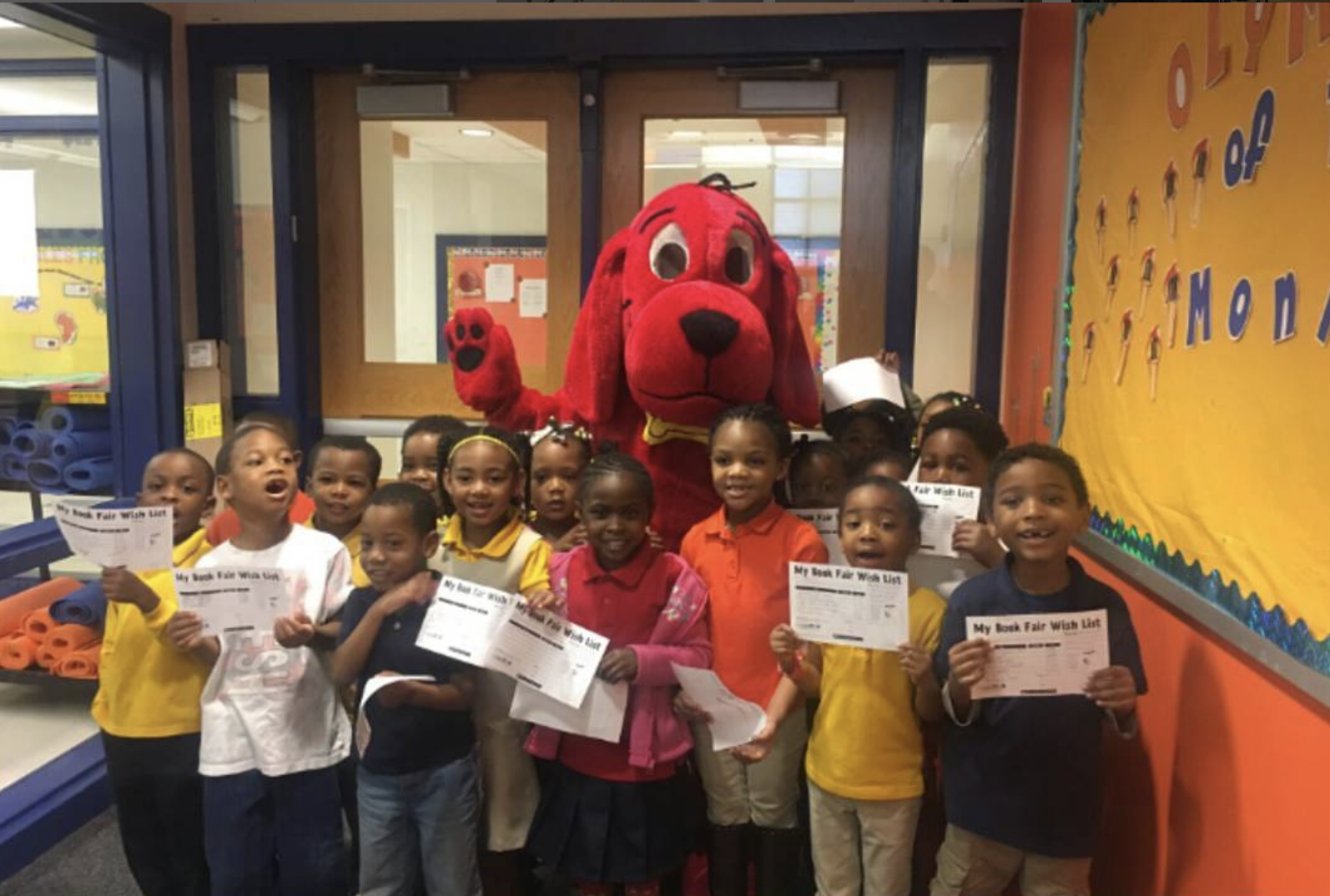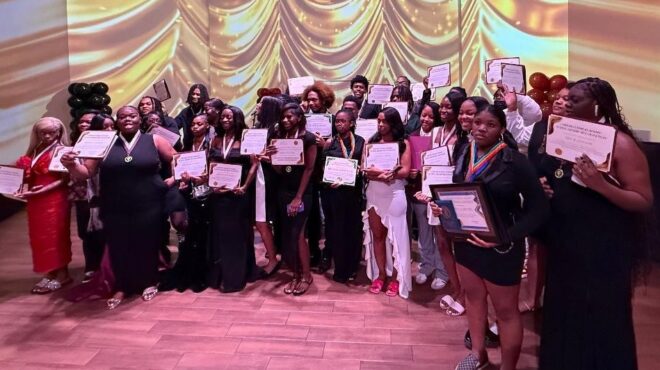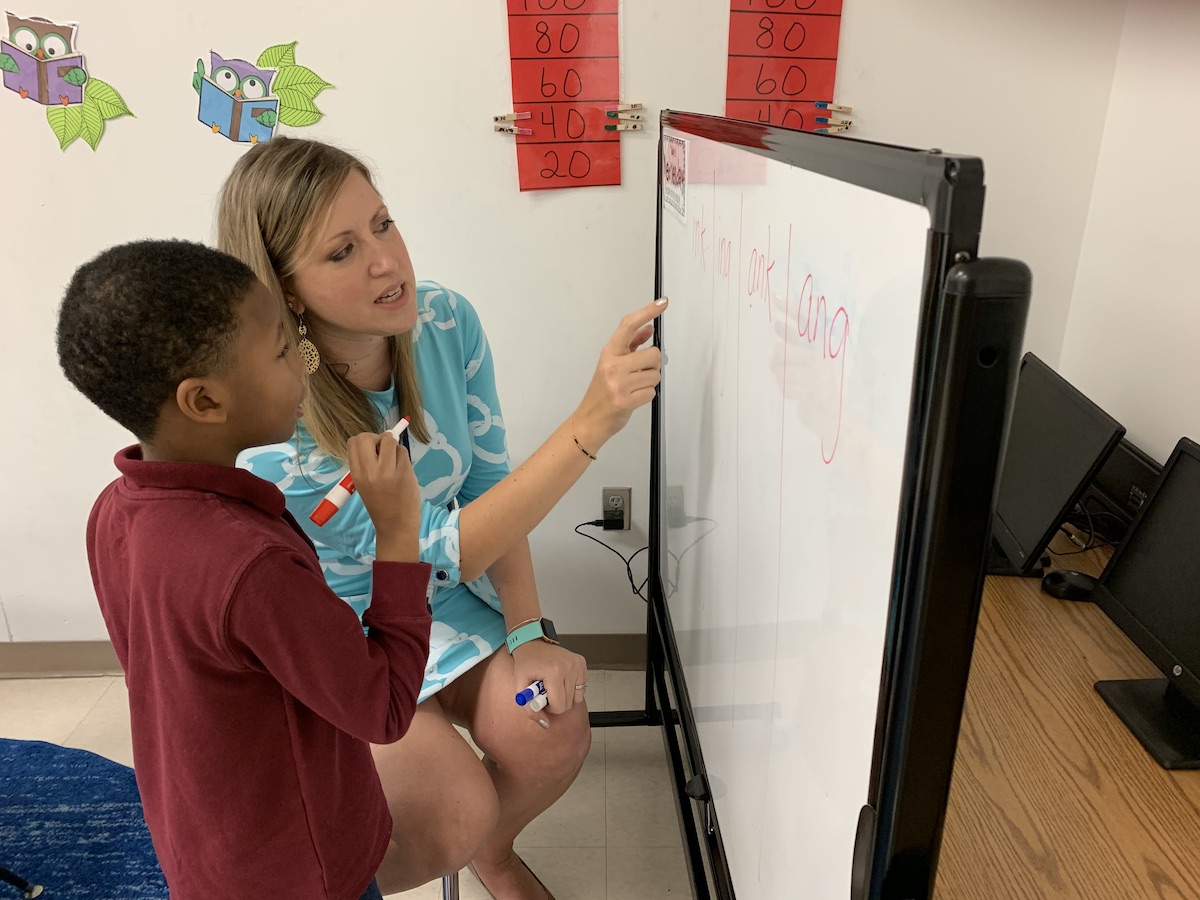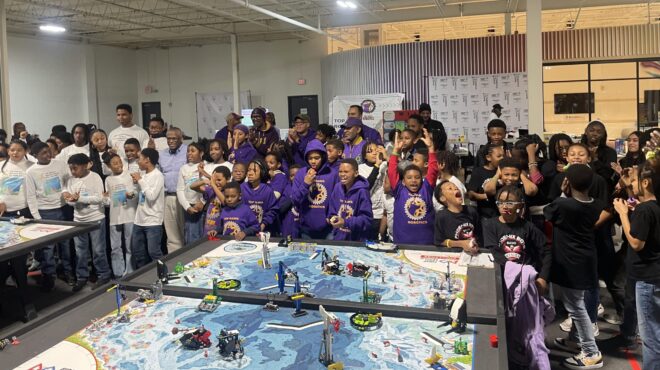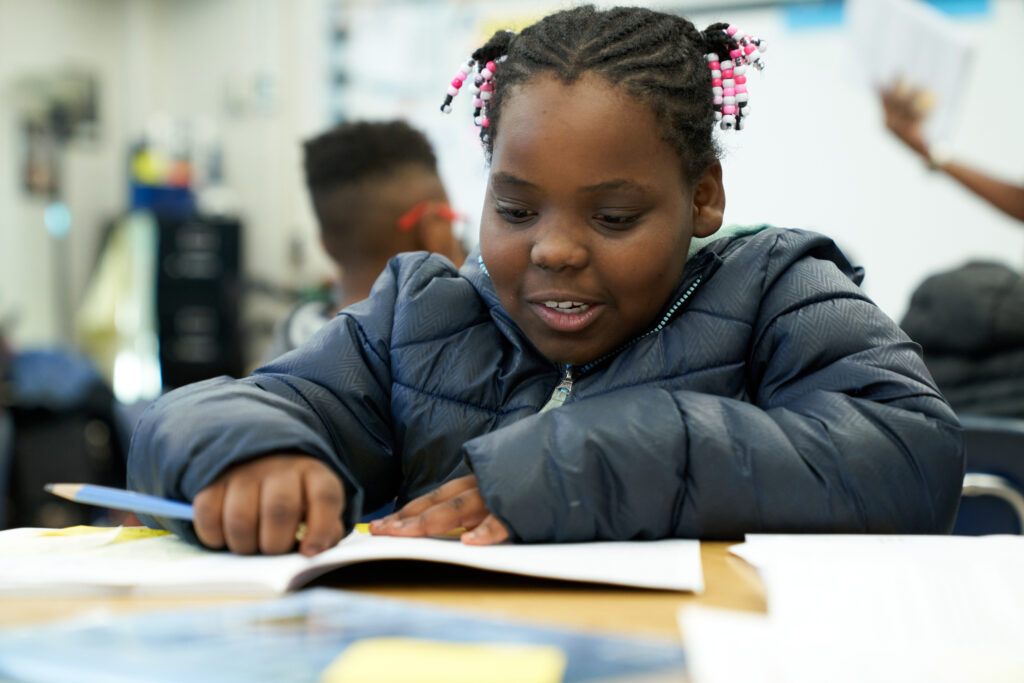 Reading is fundamental to learning, and Slater Elementary is getting creative to cultivate a love of reading for scholars. The school underwent a shift in building leadership during the 2022-23 school year and established aggressive goals to improve schoolwide literacy. To achieve these goals the following initiatives took place:
Reading is fundamental to learning, and Slater Elementary is getting creative to cultivate a love of reading for scholars. The school underwent a shift in building leadership during the 2022-23 school year and established aggressive goals to improve schoolwide literacy. To achieve these goals the following initiatives took place:
- A cohort of teachers, paraprofessionals, coaches, and other leadership staff began LETRS (Language Essentials for Teachers of Reading and Science), a professional development program based on the science of reading.
- The school implemented three reading curricula: MyView, Kendore Phonics, and Heggerty Phonemic Awareness Curriculum to ensure instruction in all pillars of literacy.
- Schoolwide challenges to promote an increase in use and achievement on Lexia Core5, a technology-based instructional program built on the science of reading.
- Administration of a detailed phonics diagnostic tool for grades K-5.
At the beginning of SY23-24, impassioned staff members were buzzing with ideas to promote a love of reading among students. A literacy committee was established, and it isn’t led from the top down; rather, it engages any staff and partners interested in fostering a culture of reading at Slater.
Below are excerpts of a conversation with Slater Reads committee members: Tiffany Smith (Instructional Coach: Literacy & Social Studies), Jacqueline Henry (MTSS Specialist & 504 Contact), and Shondria Anthony-Nolan (Media Specialist)
What were the origins of the Slater Reads literacy committee?
Slater Reads was not only bred out of necessity, but also out of good practice. Whether you are a school working towards your north star and have a ways to go, or an already high-performing school, literacy should always be at the heart of your school.
I think in all spaces and schools, people realize how important it is for students to be successful readers and read at grade level, but how that goal is achieved looks different in different schools. Our approach is to move beyond the mandates for reading instruction by building a culture where students want to read and where students fall in love with reading.
Our data indicates that we need to create a reading culture where our students demonstrate an enthusiasm for reading and value it as a vehicle for success.
What does the data say?
Across diagnostics, our data designates that we continue to put forth extra effort to build capacity in phonics, but also vocabulary development to bolster comprehension so that students understand what they are reading once they’ve learned to decode.
There’s so much research around the importance of being read to and reading daily. We want our students to benefit from connecting familiar words that are a part of their oral vocabulary in text, but also collecting new words. The National Institutes of Health has published studies on the influence of reading on vocabulary growth and the Matthew Effect, which refers to the idea that good readers read more, causing them to be better readers. The effect also works in reverse. We want to ensure we are providing our students with the skills and confidence to tackle text and identify as readers so that they will read more.
Fun fact: If students start reading for 20 minutes a day in kindergarten, by the end of 6th grade, a student will have read for the equivalent of 60 school days and 1,800,000 words per year.
What does this committee strive to do at Slater?
The biggest goal is to create a culture where students genuinely love to read and feel confident about their reading. We know reading is a gateway to success in school. At the end of the day, we want our students to thrive.
We want our scholars to be Readers Enthusiastic and Driven for Success, Slater READS!
When we first started planning, we created a “dream vision,” an ideal scenario in terms of having the best and most impactful committee. We knew we needed to create subcommittees to not only engage everyone who wanted to be involved, but also to have the biggest reach. In just a few months, a lot of work has come out of the subcommittees and we’re already seeing results.
Some short-term strategies we know will lead to success include:
- More students participating in reading bowls
- Having a book of the week/month
- Creating a mystery reader program
- Identifying new ways to leverage existing reading platforms
- Developing more incentive-based reading programs and further increasing student participation on Lexia and Accelerated Reader (AR)
Students aren’t intrinsically motivated yet, so incentivizing them is key. Some strategies include:
- Prizes for students, such as Minecraft gift cards
- Tokens to the book vending machine in the Media Center
Slater is teaching students that reading isn’t just about calling words, but also about understanding them in the context in which they are presented.
Another goal is to simply build a respect for reading and ensure students understand the innate value of knowing how to read. Specifically, experiencing reading as a gateway to experiences they have not encountered. Some struggling readers negate its value by perpetuating a stigma that reading isn’t “cool.” Our committee desires to eradicate that stigma so that scholars who want to read aren’t worried about being mocked or judged. Establishing a schoolwide culture of reading will establish a safe culture where reading is normalized and celebrated.
What does success look like?
At the simplest level, success means that all our students develop a love for reading and are constantly clamoring to get that next book in their hand. There will be a domino effect; if they read more, they’ll increase vocabulary and comprehension, and eventually you’ll see it in the data and test scores, but ultimately, we want them to be life-long readers who genuinely enjoy reading because it’s awesome, not just because they need to perform well on tests. That’s why we started our adult Book Libraries outside of each classroom where staff can share the books they’re reading; we want to demonstrate to our scholars that we are ALL readers.
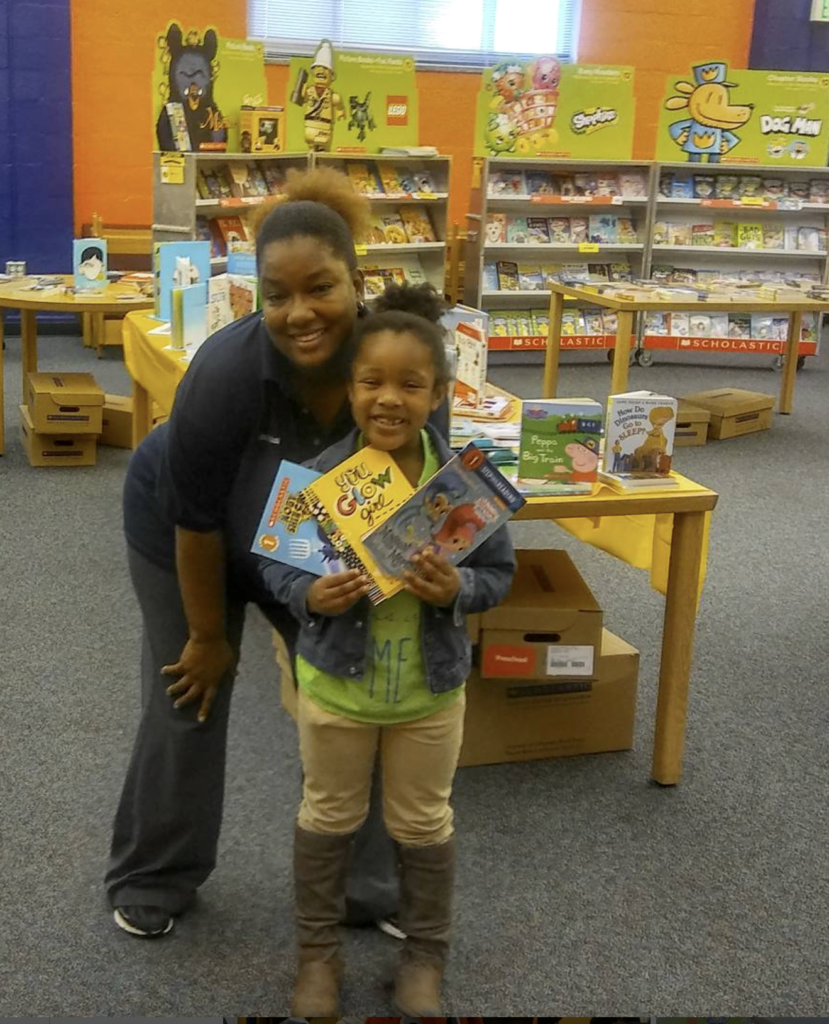
We are already seeing small wins. For instance, when we check online e-books, we see an increase in the percentage of kids reading them. When AR was introduced this year and the incentive program explained, it wasn’t long before more and more students were changing out their books so they could take another AR test.
One fun initiative has been the Uber Book Cart that Ms. Nolan, our Media Specialist, built during the pandemic when students couldn’t leave their classrooms to check out books. She turned her mobile cart into an “Uber,” she takes it from class to class so students can browse and check out books. Students are familiar with Uber and love the association. Students even put in “orders” for books to be delivered if they don’t find them on the cart.
A recent development is the new daily creed that is read during morning announcements at Slater Elementary. “I am a bold future leader, a confident reader, and a limitless believer.” Everyone at school begins their day saying these powerful words.
The Georgia Department of Education recently included Slater Elementary on its list of 155 schools recognized as having exceptional achievement or growth in third-grade reading as 2022-2023 Literacy Leaders. Slater is among the 84 schools on the list with a 15% or higher increase from 2021-22 to 2022-23 being recognized for outstanding growth.
What’s next?
While the Slater Reads committee is still in the novel stages, the energy is here and the committee – over 20 people – representing all school departments and includes partners such as LEAP Year and Read Source (Schenck School) is off to a great start. So far, the committee has rolled out incentive programs, a fall break reading challenge, and guest readers. Character readers and a Glow Party are on the horizon.
A love of reading culture is blossoming at Slater Elementary!
